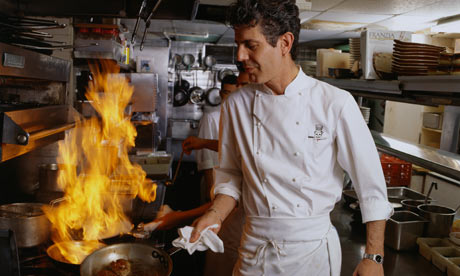
The firing of a pizza chef in Winnipeg wouldn't ordinarily appear on the international culinary radar but Scott Bagshaw's case is a little different. Having been interviewed by a communications student at the local Red River College, Bagshaw was profiled in a book called 'The Last Crumb'. You can see the interview here.
It's a nice little piece of the sort we've all seen quite often. The chef trots out a few rollicking kitchen war stories, the young journalist dutifully transcribes them - only this time, when it hits the bookshops, Bagshaw is promptly canned. Bad news for the bad boy chef but, on the other hand, when an employee has publicly admitted sexist behaviour in his work place, drinking and drug abuse, it might be considered a reasonable response from a responsible boss.
What I find most interesting about the case though, is that this poor dope probably thought he was doing the right thing. There is after all, now a whole sub-genre of food writing that features the seamy, grimy underside of the chef's life. By telling the gritty truth like 'chef' Ramsay does it, surely he should have expected admiration, kudos and unlimited girls not the Canadian version of a P45.
There have been books that purport to tell the story of what goes on behind the swing doors. George Orwell's Down and Out in Paris and London is probably the masterwork and Hotel Bemelmans gave another perspective. But these were accounts of another time. It was Tony Bourdain who really spoke to this generation. Like many of us he'd grown up with the New Journalism, with Hunter S Thompson and the astonishing tours de force of American writing from Vietnam as his influences. He wrote about kitchens like Michael Herr wrote about Khe Sahn and about the restaurant industry like Dr Gonzo did Vegas.
In doing so he spoke directly to a whole cohort of forgotten male cooks and shook food writing out of the hands of women's magazine columnists and elitist bon viveurs. (By the way, anyone who thinks food writing isn't still affected by gender, watch the first series of Val Warner's What To Eat Now. Watching a man built like a blindside flanker reading a script about lavender meringues called 'Fairy Tits' can cause enough cognitive dissonance to make your nose bleed.)
Now the wraps are off. Everyone knows that kitchens are hell-holes, that brigades operate to the social conventions of a pack of dogs and that cheffing is like rock and roll precisely because it's populated by boys who do too many drugs and refuse to grow up. Bourdain wrote that story, and to my mind broke the mould. Part of the process of doing that was to grow into the persona of the world weary veteran in recovery. He writes like that because he's been there and no longer needs or wants to live the life.
The dozens of confessional chef memoirs that have followed have become increasingly formulaic. The late nights, the fights, the hours the narcotics, fornication in the walk-in, rashes, burns and cuts. Jason Sheehan's recent, award winning Cooking Dirty wears its 'Nam narrative influences so openly and proudly that by half way through, even the most fervent consumer of kitchenporn is progressively shellshocked, sickened and then mortally bored. John deLucie's The Hunger is the least awful of eminently forgettable litany of cheap, quick knockoffs. Bill Buford's efforts have at least retained the detachment of a more professional writer but Michael Ruhlmann's series of increasingly slavering accounts of time spent pursuing haute cuisine are becoming weird enough to form a genre of their own.
When a Canadian pizza slinger reckons it's appropriate to share his war stories and his boss has to fire him for it, there's clearly a big gap between their expectations and beliefs. But I wonder this isn't symptomatic of an entirely wider phenomenon.
We've had our backlash. It's possible for men to write about food. We realise there is more to food writing than cake recipes and restaurant reviews. But does the shocking revelation of life behind the range have any more life in it? I've been known to make the odd reference to my own time in the kitchen and for a while back there I felt it added a certain rakish elan. Lately, to extend the rock and roll analogy that we seem to love so much, it's felt increasingly like some elderly rocker banging on about the time he trashed a hotel room on the Stockholm tour. I'm not sure anyone wants to hear it any more. It might have made sense when Jim Morrison did it back in '68, but when the drummer of a local pub band does it in 2010, it's a cause for pity, not praise.
What do you think? Should our Canadian chef have behaved better or just kept quiet about it? Was his boss right or wrong to react the way he did? Do we want more swashbuckling rock and roll cheffy memoirs or are we fed up with the whole genre?

